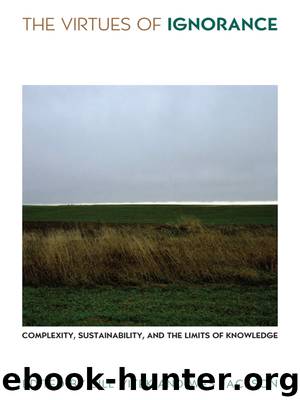The Virtues of Ignorance by Bill Vitek

Author:Bill Vitek
Language: eng
Format: epub
Publisher: The University Press of Kentucky
REVERENCE FOR LIFE: PERSONAL OPPORTUNITIES
Eating Meat
There are a number of ways we can live from this point of view. One of them is to eat little or no meat. Not only does meat eating involve killing the animal in question, but modern methods of meat production typically involve the feeding of large amounts of grain to the animals. The grain production requires monocultures that eliminate the living space of other species and require pesticides and fertilizer and other production techniques that are harmful, often fatal, to microorganisms and wildlife. Over 50 percent of the grain grown in North America is fed to livestock. Imagine the flourishing of life that would take place if this practice was discontinued or even substantially reduced. Then there is the life of the animal itself. Confinement is often such that the animal cannot turn around or even touch the earth or fellow creatures. Emotions such as those concerning sexuality, aggression, and companionship are denied normal expression.24 When we do eat meat, it should be in small amounts and only on occasion. It should come from animals raised in humane conditions and fed from sources that are compatible with resilient and healthy ecosystems.
Energy
The practices that surround energy consumption also afford us ways of avoiding dilemmas. As already noted, it is predicted that global warming alone will bring about the loss of hundreds of thousands of species in the next century and further harm to the already radically disadvantaged human poor. We can avoid, or at least reduce the horror of, this outcome by drastically reducing our energy use—given the current technological mix, by reinforcing existing trends toward smaller families and accelerating the development of alternative technologies.
On the Land
In managing my tree farm in Quebec, I have been guided by Leopold's practices at his legendary farm in Sand County, Wisconsin. We should manage not toward a single objective—but toward health of the land itself. Here is how Leopold approached the issue of land health. He suggested that the symptoms of land sickness are “abnormal erosion, abnormal intensity of floods, decline of yields in crops and forests, decline in carrying capacity …, a general tendency toward the shortening of species lists and of food chains, and a world wide dominance of plant and animal weeds.”25 A promising way of giving greater specificity to Schweitzer's concept of reverence for life is to connect it to the idea of land health—where land is understood to include life and its support systems such as air, soil, and water.
My fields are farmed organically and in a manner that reduces erosion. The tree plantations, which are small and interspersed with managed and unmanaged native forest, are planted with soft woods to maximize production. Part of the yield will be harvested about twenty years after planting for pulp and the balance forty to fifty years after planting for saw timber. The farm includes native woodland managed to preserve a diversity of indigenous species so that, in the event of a major perturbation, such as
Download
This site does not store any files on its server. We only index and link to content provided by other sites. Please contact the content providers to delete copyright contents if any and email us, we'll remove relevant links or contents immediately.
Craft Beer for the Homebrewer by Michael Agnew(18230)
Marijuana Grower's Handbook by Ed Rosenthal(3675)
Barkskins by Annie Proulx(3363)
Project Animal Farm: An Accidental Journey into the Secret World of Farming and the Truth About Our Food by Sonia Faruqi(3211)
The Plant Messiah by Carlos Magdalena(2920)
Red Famine: Stalin's War on Ukraine by Anne Applebaum(2917)
0041152001443424520 .pdf by Unknown(2842)
Organic Mushroom Farming and Mycoremediation by Tradd Cotter(2684)
In the Woods by Tana French(2581)
Beer is proof God loves us by Charles W. Bamforth(2450)
7-14 Days by Noah Waters(2409)
Between Two Fires by Christopher Buehlman(2301)
Borders by unknow(2301)
Reservoir 13 by Jon McGregor(2300)
Meathooked by Marta Zaraska(2255)
The Art of Making Gelato by Morgan Morano(2249)
Birds, Beasts and Relatives by Gerald Durrell(2214)
The 7 Habits of Highly Effective People: Powerful Lessons in Personal Change (25th Anniversary Edition) by Covey Stephen R(2188)
The Lean Farm Guide to Growing Vegetables: More In-Depth Lean Techniques for Efficient Organic Production by Ben Hartman(2125)
